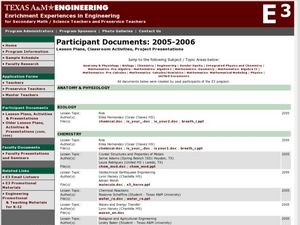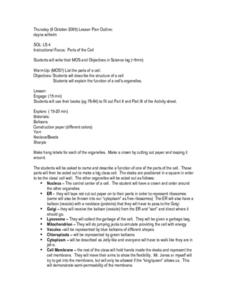Howard Hughes Medical Institute
The Day the Mesozoic Died
While this is not the traditional, step-by-step lesson plan, it is chock-full of material that you can easily incorporate into your earth history unit. Its main purpose is to serve as a guide to using a three-part film, The Day the...
Curated OER
Using Plant Pigments to Link a Suspect to a Crime
Students use chromatography to separate plant pigments collected from a fictitious crime scene and suspects. They compare the Rf values of the plant pigments to determine whether the plant pigments found on any of the suspects match the...
Curated OER
"Investigating Soil Color and Texture"
Ninth graders will identify/understand the differences between soil and dirt. They will classify soil color accurately and use Munsell notation to describe it (Munsell books provided).Students will classify soil texture using the feel...
Curated OER
Analyzing Birds and Planes
Students find a variety of topics and subjects in this instructional activity. In the math section of this instructional activity, students graph linear equations and analyze their data. They solve one and two step equations to find the...
Curated OER
Parts of the Cell
Students examine plant and animal cells to observe the organelles present in the cell, to match the function of each to the organelle on a cell model and to build a model of the plant or animal cell.
Curated OER
The Aging Brain: A Lesson on Alzheimer's Disease
Pupils investigate the aging brain and its relationship to the occurrence of Alzheimer's disease. They need to have prior knowledge of brain and nervous system anatomy in order to participate in this lesson. Students compare an aging...
Curated OER
Water Retention and Soil Variation in Local Ecosystems
Students identify the differences in local soil types and the relationship between soil size and water retention. They are introduced to microenvironmental conditions in ecosystem sustainability.
Curated OER
Soil In The Amazon
Students grow plants in soil representing that found in the Amazon basin. They compare results to plants growing in fertile soil and soil fertilized with leaf compost. Students chart, average and graph plant growth by height.
Students...
Curated OER
SHOW 303: The Channel Island Fox
Pupils explore how archaeologists and other scientists use different clues to piece together a picture of the past. Students perform activities that allow them to conduct three types of scientific research. They discuss their...
Curated OER
Dishing the Dirt Part 2
Students explore the differences between specific soil characteristics. They participate in an experiment in which they discover soil texture. They write their observations in a journal.
BiologyWise
Biology Wise: Tips on How to Make a Plant Cell Model
Describes the steps for making a model of a plant cell in two different ways. The first way uses mostly sweet foods and the second way uses a shoebox, clay, and simple materials.
BiologyWise
Biology Wise: How to Make a 3 D Dna Model Project
Describes the steps for how to make a model of DNA using colored polymer clay and wire. Students will gain a good understanding of the structure of DNA by doing this project.
BiologyWise
Biology Wise: Tips on How to Make a 3 D Plant Cell Model
Describes the steps in how to make a model of a plant cell using clay and simple materials found at home. Suggestions for variations are also given.










